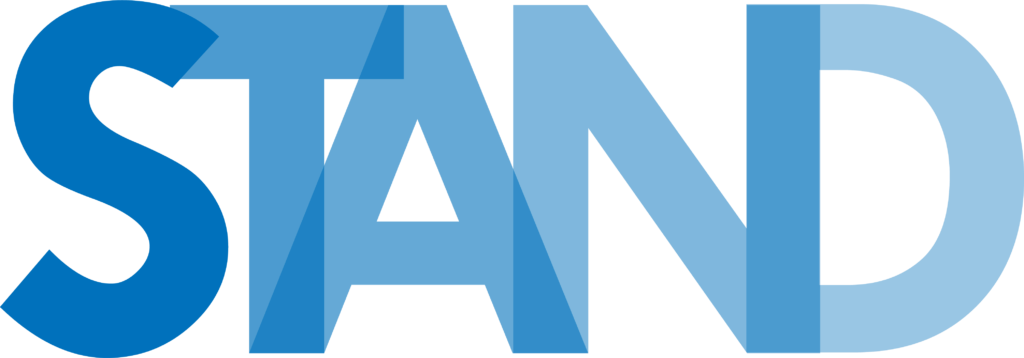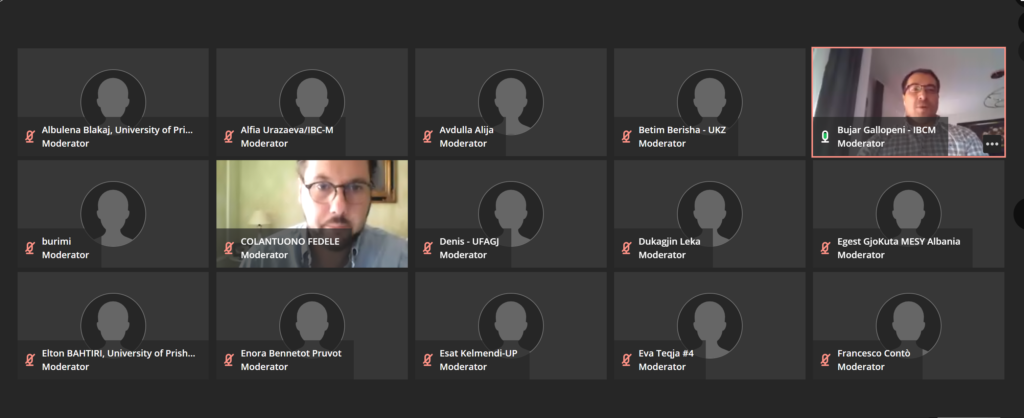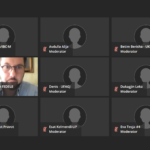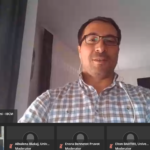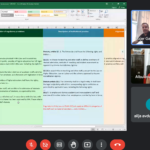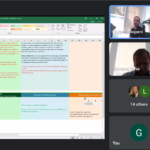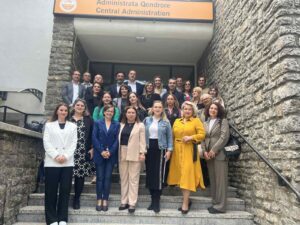On 20 and 21 September 2021, the workshop on “Best practices on University Governance and staffing autonomy” was held in a virtual environment hosted by the University of Foggia. The workshop was part of the STAND Project framework and its WP3: Enhancement of University governance to promote autonomy (3.1. Workshops with Program country institutions to adopt best practices on University Governance). This task aimed at presenting best practices on university governance in Italy, training on managing human resources, and adopting adequate and transparent recruitment procedures and mechanisms with the contribution of the other project partners.
Day 1 – Autonomy and Governance at the University of Foggia
The first day of the workshop began with welcoming remarks of Prof. Michele Milone – Director Dept. of Economics, University of Foggia, Prof. Piermichele La Sala – STAND Principal investigator at Dept. of Economics, University of Foggia and Prof. Mihone Kerolli, IBCM College Director, STAND Project Coordinator who welcomed the participants and expressed gratitude to all partners contributing towards successful completion of the project activities.
The first to present was Prof. Francesco Contò, who gave an insightful presentation on the “Autonomy and Governance at the University of Foggia.” He talked about the Italian legislation framework for universities and the integrated strategic plan for managing performance cycles, taking into account its connection with the other governance management plans and tools. He described how the plans are developed at the department level, the main steps through 5 strategic areas, including the human resources management.
Prof. Madia D’Onghia gave the second presentation, Dept. of Law UniFG (President of Warranty Committee – CUG) on Gender balance and equality, explaining the UniFG’s Experience and her role in the University within the Gender issues Committee. She is also a member of the task force on the gender balance of the CRUI (Italian Conference of University Rectors). The presentation focused on the Italian legislation related to gender equality in public work environments and how this aspect has been evaluated and applied in the University of Foggia, through its periodical reports, statistics investigation and initiatives for equal opportunities, enhancement of the well-being of workers, and against discriminations.
Legislation on University autonomy for staff recruitment in Italy was the third presentation given by Prof. Caterina Tricase. It covered all the aspects of the Italian legislation about the recruitment of academic staff and the requirements, steps, and upgrades from the researcher level, to the associate and full professor position.
Prof. Giulio Esposito, Head of International Relation Office at UniFG presented the topic Enhancing staff mobility as the key to your institution’s internationalization, introducing the Experience of the University of Foggia about the opportunities. He gave a general overview of why staff trainnig through mobilities is beneficial for the insitution mentioning three crucial aspects: increasing visibility, assuring international acknowledgment, and strengthening cooperation among HEIs.
Prof. Mariantonietta Fiore (UniFg) provided insightful information on Double degree and internationalization – presentation of the new course of Economics L16 and cooperation opportunities,
The presentation aimed at introducing the development processes of new courses degrees and how this can contribute to international relationships and promote students exchange for a joint course and double degree among Unifg and abroad universities.
Prof. Mariarosaria Lombardi gave the presentation on the topic of “The Third Mission in the Italian University system: the Experience of Dept. of Economics at UniFG.” She introduced the national framework for evaluating quality, results from academic research, and how to share and protect them. The aspects of the so-called “Third Mission” of the Italian University system have been discussed, and some examples about its implementation at UniFg Dept. of Economics were provided. A final overview on the importance of this evaluation process with the number of employees and staff categories in the University was also discussed during the presentation.
Rinor Qehaja from IBC-M – presented the last on the first day on – “Discussion on how staffing autonomy is regulated and organized in other partner institutions,” tackling the topics discussed throughout the day and trying to adopt best practices given by UniFg.
Day 2 – Autonomy and Governance among STAND EU Universities – experiences and good practices
The first topic presented on the 2nd day was Governance & staffing autonomy throughout Europe, given by Enora Pruvot from the EUA. Representing the work and initiatives of EUA, she gave an overview of the governance and staffing autonomy main factors and differences among EU countries.
Second to present was Prof. Krešimir Grilec, Vice Dean of the Zagreb University. He gave an overview on Experience on staff autonomy by the Zagreb University, Croatia. He explained recruitment procedures for academic and administrative staff along with promotion procedures for both.
“Governance bodies & legislations for governance autonomy at UniFg” was the topic covered by Dr. Tommaso Campagna. Prof. Campagna talked about the Italian legislation, University Governance, and its evolution. He then presented the Governance structure and bodies at the University of Foggia, focusing on the role of main bodies, the rector election and functioning, etc.
Prof. Dr. Thorsten Blecker from TUHH presented the topic of “Experience on staff autonomy by the Hamburg University of Technology, Germany.” He provided insights into the Governance of the German University, presenting the TUHH governance structure and Responsibilities of University Committees and Officers of the Presidium, the role of the Student Committees and Staff Council.
Prof. Besa Arifi, SEUU provided insights regarding the Experience on staff autonomy in the SEEU, North Macedonia. She briefly explained the key dimensions of university autonomy followed by a detailed description of the SEEU Governance structure. An exciting part of the presentation was to hear about the uni’s open, transparent, and merit-based policies. It was also mentioned that the SEEU applies a system of Total Quality Management, which assures the creation, development, implementation, monitoring, and evaluation of policies, procedures, structures, and quality initiatives. The University is ISO certified. Prof. Arifi explained that the recruitment, appointment, promotion, retention, and compensation of academic and support staff are consistently facilitated with institutional policies and legislation through Human Resources Office (HRO).
Prof. Bujar Gallopeni (IBC-M) and Prof. Avdulla Alija (UP) presented The scorecard assessment and staffing results collected in Kosovo as the day’s last presentation. They started by presenting the main aim of the WP2. Development of the University Autonomy Scorecard and the activities planned under this work package for three countries where the assessment takes place: Kosovo, Montenegro, and Albania. Law and statutes of Higher Education in Kosovo were briefly explained. They continued by showing some of the results collected and the next steps taken on the country level and overall under WP2.
In the end, a discussion ensued among the participants about the topics presented throughout the day and the conclusions of the workshop.
